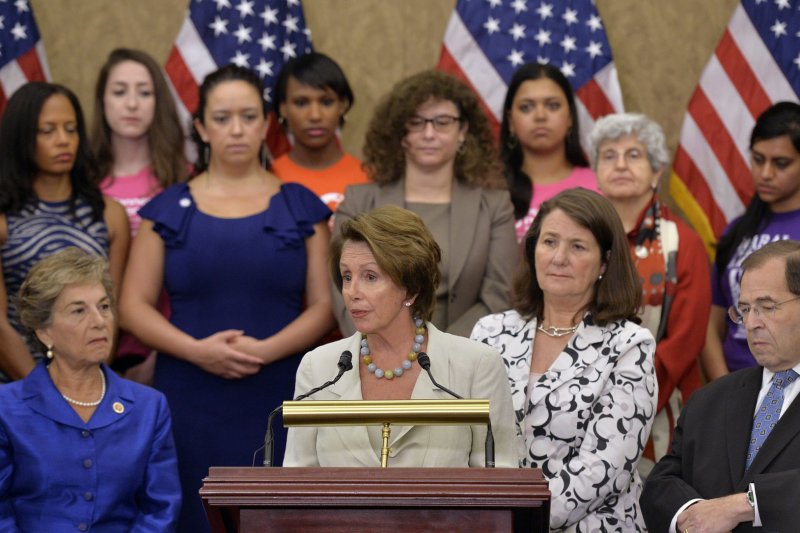House Minority Leader Nancy Pelosi, D-Calif., (L) speaks on the "Not My Boss's Business Act," legislation change the Supreme Court's ruling on women's health in the Hobby Lobby decision, in Washington, D.C. on July 15, 2014. Pelosi was joined by fellow democrats and supporters of women's health rights. UPI/Kevin Dietsch |
License Photo
WASHINGTON, July 16 (UPI) -- Senate Republicans voted down a measure Wednesday that would have reversed a Supreme Court decision to allow certain corporations to refuse to provide health insurance that includes contraceptive coverage.
Voting 56 to 43, Democrats failed to rustle up the 60 votes necessary to proceed to a final vote. Three Republicans, Sens. Lisa Murkowski, R-Alaska, Susan Collins, R-Maine, and Mark Kirk, R-Ill., voted for the measure.
Majority Leader Harry Reid, D-Nev., changed his vote to no so the measure could be brought up again. Sen. Brian Schatz, D-Hawaii, was the only member not to vote.
Democrats in both the House and Senate have been pushing for the bill, dubbed the "Not My Boss' Business Act," that they say would correct the court's misinterpretation of the 1993 Religious Freedom Restoration Act in its Hobby Lobby decision last month.
The bill, as written, would restrict the RFRA so that it could not be applied to for-profit companies for healthcare services for federally mandated health services. Religious non-profits, such as churches, would remain exempt.
But Republicans contest that Democrats are deliberately misinterpreting the Supreme Court's ruling, arguing that it does not block women from getting contraception, only from forcing her employer to pay for it.
Introducing a competing bill, called the Preserving Religious Freedom and a Women's Access to Contraception Act, Sen. Kelly Ayotte, R-N.H., says women and corporations run by those with deeply held religious objections can both win.
Sen. Kelly Ayotte, R-N.H., said the dialogue has been driven away from the religious freedom rationale of the ruling and distorted for political leverage.
"Our bill will reaffirm that no employer can prohibit an employee from purchasing an FDA-approved drug or medical device, including contraception," she said Wednesday.
The bill, co-authored by Ayotte, Senate Majority Leader Mitch McConnell, R-Ky., and Sen. Deb Fischer, R-Neb., would affirm that employers cannot prohibit employees from accessing any FDA approved drug, including contraception.
But the measure has Democrats scratching their heads.
"Senator, that's the law right now," said Rep. Louise Slaughter, D-N.Y., pointing out that while under Hobby Lobby, women can still get their contraception, but would have to pay for it out of pocket.
Regular birth control pills, even with insurance, can cost several hundred dollars a year, while an intrauterine device, or IUD, can cost more than $1,000. Under the Affordable Care Act, insurance plans must provide women with contraception at no additional cost, classifying it as preventative care.
"Mitch McConnell's bill is not any attempt at a solution but a failed political ploy that is sure to backfire," said Illyse Hogue, president of NARAL Pro-Choice America. "It would 'allow' women to pay twice for their birth control: once through insurance coverage (which their boss can then take away) and then again with their own money at the pharmacist. Thanks but no thanks."
House Democrats plan a procedural vote on their version of the measure, which is also expected to fail in the Republican-controlled chamber.















